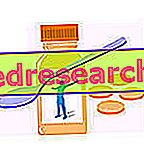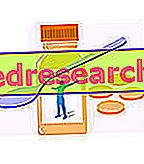What is glossitis?
The term "glossitis" is used in the medical field to indicate a generic inflammation of the tongue, which appears visibly red, swollen and painful.

Causes
More than a disease in itself, glossitis is a symptom common to many diseases: it is therefore a signal that the body sends us to warn that some physio-metabolic mechanism has jammed.
At the origin of glossitis there can be innumerable causes, listed below:
- Tobacco abuse, alcohol, spicy foods, foods that are too hot
- Iron deficiency anemia
- Pernicious anemia (the mucous membrane of the tongue is smooth and reddened at the edges and at the tip)
- Deficiency of folic acid (vitamin B9) in the diet
- Deficiency of vitamin B12 (cyanocobalamin) in the diet
- Teeth disorders: in these cases, inflammation localized to the tongue can be caused by its continuous friction with chipped teeth, prostheses or capsules, and orthodontic appliances
- Liver disorders
- Inheritance
- Exposure to irritants
- Yeast infection (eg thrush or oral candidiasis)
- Infections sustained by viruses (eg Herpes simplex)
- Bacterial infections (eg syphilis and scarlet fever)
- Oral Lichen planus
- Geographical language (or migrant glossitis ): this disorder presents with red or white patches on the lingual mucosa that tend to migrate from one side of the tongue to the other. Etiology (search for causes) is still under study.
- Tongue piercing
- Allergic reactions to drugs taken by mouth (the main culprits are ACE inhibitors, used for the treatment of hypertension), foods, toothpastes, mouthwashes, dyes present in sweets, plastics or prosthesis resins
- Poor hydration / reduction in the amount of saliva in the mouth (also caused by diseases such as Sjögren's Syndrome)
- Long-term antibiotic therapy, responsible for weakening the immune system
- Burns to the tongue
- Ingestion of foods rich in oxalic acid crystals: these tiny and sharp mineral aggregates can irritate the mucous membrane of the tongue and oral cavity by rubbing, triggering the symptoms of glossitis (as happens, for example, following the ingestion of kiwi).
Given the very long list of possible causes of glossitis, it is clear how important the differential diagnosis is, namely the precise and indisputable demonstration of the underlying disorder. Only after removing the triggering agent, the swollen and reddened tongue may return to its physiological condition.
Symptoms
The first symptoms experienced by a patient suffering from glossitis are undoubtedly the redness of the tongue, the sensation of burning and numbness of the same and the evident lingual swelling. Often, one can notice a more or less marked alteration of the natural color of the tongue, which becomes more bright or pale (a typical sign, the latter, of pernicious anemia).
The lingual mucosa tends to desquamate, giving rise to extremely sensitive patches with variable extension: in general, the patient feels a burning sensation or an unpleasant tingling sensation when taking hot or acid substances, precisely because the tongue is desquamated. Because of the obvious flaking, the tongue can change its appearance: to the touch, it is in fact smooth and smooth.
If the glossitis becomes chronic, the disease can cause the destruction of the papillae that normally cover the back of the tongue: in similar circumstances, the papillae diminish in number, until they disappear. When the papillae are destroyed due to glossitis, the patient is no longer able to perceive the taste of food.
When the glossitis causes significant lingual swelling, the patient complains of difficulty in chewing, speaking or swallowing.
risks
Normally, glossitis is not a serious disorder and, in most cases, tends to self-purify over a short period. Nevertheless, some particularly sensitive subjects may experience serious disorders: glossitis can in fact cause an exaggerated inflammation of the tongue, such as to hinder or even block the respiratory tract.

Diagnosis and treatment
Before proceeding with the treatment, the patient must clearly undergo specific tests to ascertain the source of the disorder, thus clarifying the problem responsible for lingual inflammation. The diagnosis begins with the anamnesis, that is with the collection of sensations and symptoms reported by the patient. Subsequently, the doctor proceeds with the analysis of the tongue and the observation of its appearance (color, consistency, presence of spots, presence / absence of the papillae, etc.).
If the doctor deems it appropriate, the patient will have to undergo a series of blood tests to rule out any metabolic abnormalities.
After having clarified any doubts, we proceed with the cure, which varies according to the cause. The main goal of therapy is to control and block inflammation of the tongue, regardless of the causative factor.
The glossite treatment includes:
- Sciacqui with analgesic mouthwashes, containing for example lidocaine
- Gargle with antimicrobial mouthwashes (eg chlorhexidine) or antihistamines (eg diphenhydramine)
- Cleansers with corticosteroid-based mouthwashes, powerful anti-inflammatory drugs
- Taking food supplements, indicated when the glossitis depends on vitamin deficiencies
- Treatment for pernicious anemia
- Taking by mouth antibiotics or antifungals, indicated when the glossitis depends, respectively, on bacterial or fungal infections (eg from Candida albicans ) ascertained
Tips
In addition to following the therapy prescribed by the doctor, to speed healing and reduce the annoying symptoms, the patient is required to follow some valuable precautions:
- Avoid taking too hot or excessively cold food
- Do not take acid or irritating foods or drinks; Among the foods to avoid in case of glossitis, we mention: excessively spicy foods, lemons and acid fruits, kiwis, spirits and pineapple
- Rinse the mouth with specific mouthwashes containing substances such as analgesics, antihistamines, corticosteroids or antibacterials. The choice of mouthwash is clearly delegated to the doctor.
- Correct the power supply (when necessary)
- Pay particular attention to multi-daily oral hygiene, which must always be performed with toothpaste, brush and dental floss
- Not smoking
- Don't drink alcohol
Self-medication is strongly advised without having first consulted an expert: glossitis could indeed hide serious problems.



